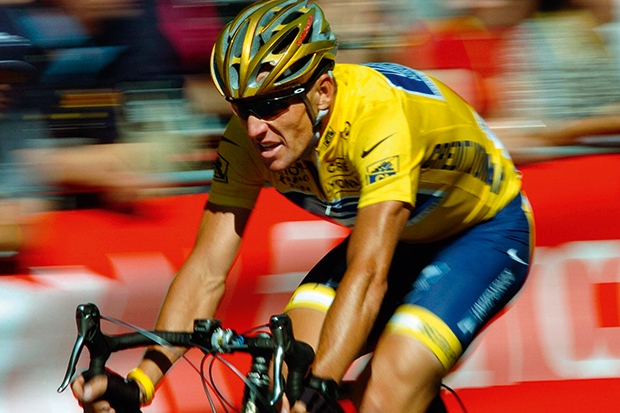On Saturday at Mont St Michel, the 103rd edition of the Tour de France begins, and the favourite to win is again British. As a long-term cycling fan, even typing those words gives me a frisson. When I started watching in the 1980s there were few British riders to cheer on — and none challenging for overall victory. Bradley Wiggins became the first Briton to win in 2012. He was followed by Chris Froome in 2013 and 2015. The French haven’t won since 1985. Britain is now a cycling superpower and cycling has become a popular sport. So why aren’t I celebrating?
The problem is the lingering doubt that none of this is real. There’s no reason to question Froome’s performances, except that there are few champions who we can confidently say never took drugs. Jacques Antequil, five times winner in the 1950s and ’60s, is quoted as saying: ‘You can’t win the Tour de France on mineral water alone.’ To ride 3,000 kilometres, you need a bit of help.
Pre-war riders took cocaine and even strychnine washed down with brandy. Later amphetamines came in, followed in the 1980s by steroids. Drug tests were introduced in 1966, but not rigorously enforced. This wasn’t really a problem because neither speed nor steroids gave riders much advantage over a three-week Tour de France: in the late 1980s, an anti-doping crusader like America’s Greg LeMond could win.
The problem came in the 1990s with the introduction of EPO. This drug enabled an athlete’s blood to carry more oxygen and therefore produce more power for longer. LeMond and his fellow 1980s star Laurent Fignon suddenly seemed way off the pace. When Miguel Indurain, who won five times between 1991 and 1995, rocketed past Fignon in the 1992 Tour, Fignon said that the performance was ‘extraterrestrial’. If that was meant as a coded reference to doping, Indurain has always denied it, his exceptional physiology lending support to his denials.
But rewatching 1990s cycling you can’t miss the ‘extraterrestrial’ performances. EPO could turn journeymen such as Bjarn Riis into Tour de France champions. Sprinters, heavily muscled cyclists built for flat roads, suddenly became mountain climbers.
The era of unlimited EPO use came to an end in 1998 when a systematic doping programme was uncovered in the Festina team, and a new ‘clean’ era was ushered in with the return of Lance Armstrong in 1999 from a near-death brush with cancer. I don’t need to tell you how that ended. Following Armstrong’s disgrace, we are once again in a new clean era — though the cloud of suspicion still hangs over many of Froome’s rivals such as Alberto Contador of Spain, who was stripped of his 2010 Tour title after testing positive for clenbuterol.
And now there’s ‘mechanical doping’. In January Belgian cyclocross rider Femke Van den Driessche was caught with a tiny motor in her bicycle. There are videos on YouTube of wheels spinning forcefully after riders have come off. You can dismiss such evidence as conspiracy theories, but it’s hard not to be suspicious of a sport that has failed its fans so many times in the past 25 years.
Still, come July, I will be watching as I always do. The Tour at its best is the most brutally thrilling of all sports and I really want to believe that it’s real.






Comments